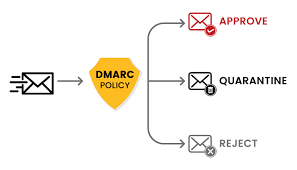DMARC stands for domain-based message authentication, reporting, and conformance. It is an email authentication and reporting policy that leverages SPF or DKIM protocols to perform more advanced authentication of email messages.
SPF allows a domain owner to authorise IP addresses to send emails under the domain name, and IPs like Yahoo and Google use it. DKIM, on the other hand, uses signatures to verify the integrity of an email and its source.
So, with DMARC, a domain owner can create an authentication procedure and also instruct an incoming server on what to do if an email fails to pass the authentication policy.
DMARC can allow you add links to the author’s domain name, publish policies for handling recipient authentication failures, and establish reports with details of each check to improve the domain’s protection from fraudulent emails.

Why is DMARC Important?
Authentication protocols like DKIM and SPF were developed over a decade ago, and even though adoption has increased, the problem of deceptive and fraudulent emails still lingers on; especially with the rise of social media and the ubiquity of e-commerce. Phishers and spammers now have tremendous financial incentives to compromise user accounts, which facilitates theft of credit cards, passwords, bank accounts and more.
However, the good news today is that DMARC addresses these issues; it is a more advanced technology that can authenticate emails and significantly reduce fraudulent activities.
DMARC is the easiest way to ensure the senders and receivers can determine whether or not a message is legitimate and what to do if the message doesn’t pass the authentication test. It can help protect users, secure emails, and save brands from reputation damage.
However, note that DMARC can only protect you against direct domain spoofing, it does not block all types of phishing attacks.